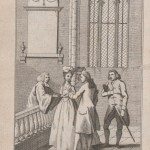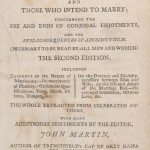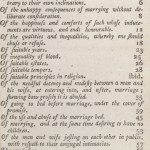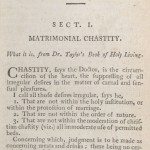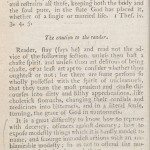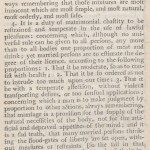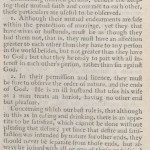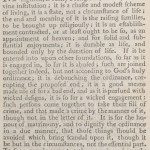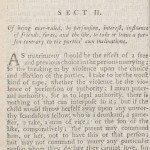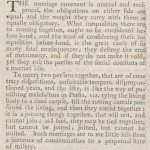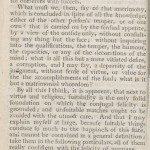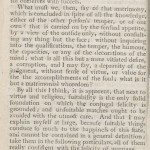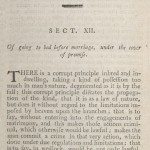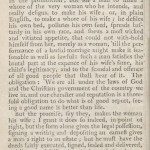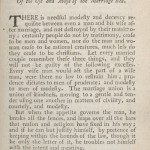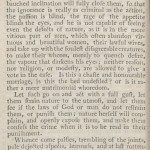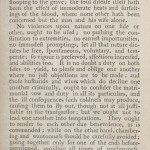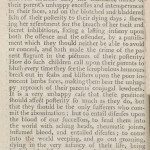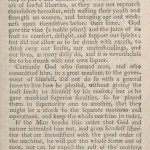Directions for Married Persons: Introduction
Introduction: Malcolm Dick
Source: Local Studies and History, Birmingham Central Library, UK
Directions for Married Persons was written by John Martin and published in Birmingham in 1791. It provided instructions to potential and actual husbands and wives to be chaste, modest and avoid “violent lusts”. The dangers to the earthly health and spiritual well-being of those who ignored this guidance were described in explicit detail.
The late 18th century witnessed a proliferation of books and pamphlets to instruct the lower orders. The best known examples were by the evangelical Hannah More. From her rural retreat in the Mendip Hills she wrote pamphlets in fictional form for children and adults. Martin’s Directions were not presented in narratives. They were similar in style and format to the extensive quantity of sermons which issued from many Anglican clerics and nonconformist ministers. They were published at a time when literacy was growing and printing was expanding. There were, however, more important reasons why these publications were produced in great numbers in the final decades of the 18th century. Rapid industrialisation and urbanisation destroyed traditional social customs, provided opportunities – or temptations – for young migrants and opened their minds to new social, political and cultural experiences. Britain’s Evangelical Revival reflected the revulsion of religious conservatives towards a perceived rise in irreligion, radicalism and lack of respect for authority and moral codes.
Birmingham provided a laboratory for new experiences. It was a rapidly growing industrial town which was populated by young, relatively affluent migrants from Britain and beyond. Atheism lived and radicalism flourished in this religiously and culturally diverse centre. Directions for Married Persons presents an attempt by a conservative to create strong bonds of sexual restraint in circumstances where men and women were tempted by “the floodgates of liberty”.
—————————————
DIRECTIONS
FOR
MARRIED PERSONS,
AND
THOSE WHO INTEND TO MARRY;
CONCERNING THE USE AND ENDS OF CONJUGAL ENJOYMENTS,
AND THE
EVIL CONSEQUENCES OF ABUSING THEM.
(NECESSARY TO BE READ BY ALL MEN AND WOMEN.)
THE SECOND EDITION.
INCLUDING
THOUGHTS on the Nature of Matrimony… On matrimonial Chastity… On suitable Qualifications, Years, Blood, Estates, Temper, &c.
On the Decency and Modesty, necessary between Man and Wife; on the Use and Abuse of the Marriage Bed. – On conjugal Intimacies, virtuous Love, &c.
THE WHOLE EXTRACTED FROM CELEBRATED AUTHORS,
WITH MANY
ADDITIONAL SENTIMENTS BY THE EDITOR,
JOHN MARTIN,
AUTHOR OF TRENCHFIELD’S CAP OF GREY HAIRS FOR GREEN HEADS.
BIRMINGHAM,
PRINTED BY AND FOR T. PEARSON:
AND SOLD BY R.BALDWIN, PATER-NOSTER ROW, LONDON.
MDCCXCI
CONTENTS.
Matrimonial chastity, what it is…Page 1
Matrimony, what is…5
Of being over-ruled, to take or leave a person contrary to their own inclinations…6
Of the unhappy consequences of marrying without deliberate consideration…8
Of the happiness and comforts of such whose inducements are virtuous, and ends honourable…11
Of the qualities and inequalities, whereby one should chuse or refuse…18
Of suitable years…23
Of inequality of blood…25
Of suitable estates…26
Of suitable tempers…28
Of suitable principles in religion…ibid.
Of the needful decency and modesty between a man and his wife, at entering into, and after, marriage; shewing how grossly it is abused…35
Of going to bed before marriage, under the cover of promise…39
Of the use and abuse of the marriage bed…45
Of marrying, and at the same time desiring to have no children…53
Of the man and wife jesting with each other in public with respect to their conjugal intimacies…57
The conclusion…66
Addenda, on virtuous love and friendship…74
The temple of virtuous love…81
The temple of lust…83
On domestic happiness, as the friend of virtue…84″
DIRECTIONS, &c. &c.
SECT. 1.
MATRIMONIAL CHASTITY.
What it is, from Dr. Taylor’s Book of Holy Living.
CHASTITY, says the Doctor, is the circumcision of the heart, the suppressing of all irregular desires in the matter of carnal and sensual pleasures.
I call those desires irregular, says he,
1. That are not within the holy institution, or within the protection of marriage.
2. That are not within the order of nature.
3. That are not within the moderation of christian chastity (viz.) all immoderate use of permitted beds.
The caution to the reader.
Reader, stay (says he) and read not the advice of the following section, unless thou hast a chaste spirit, and unless thou art desirous of being chaste, or at least art apt to consider whether thou oughtest or not; for there are some persons so wholly possessed with the spirit of uncleanness, that they turn the most prudent and chaste discourses into dirty and filthy apprehensions, like cholerick stomachs, changing their cordials and medicines into bitterness, and in a literal sense, turning, the grace of God into wantonness.
It is a great difficulty to know how to reprove with decency, offences against decency; how to expose modestly things which it is hardly modest to name, and scourge immodest actions with an unblameable modesty; so as not to offend the modest ears of those who read them.
For which reason I have used all the care I could: and if any man will snatch the pure taper from my hand, and hold it to the devil, he shall only burn his own fingers, but shall not rob me of that care and good intention that I write with; read it
“3. Married persons must keep such modesty and decency of treating each other, that they never force themselves into high and violent lusts, always remembering that those mixtures are most innocent which are most simple, and most natural, most orderly and most safe.
4. It is a duty of matrimonial chastity to be restrained and temperate in the use of lawful pleasures: concerning which, although no universal rule can be given to all persons, any more than to all bodies one proportion of meat and drink; yet married persons are to estimate the degree of their licence, according to the following proportions: 1. That it be moderate, so as to consist with health; 2. That it be so ordered as not to intrude to much upon our time; 3. That it be with a temperate affection, without violent transporting desires, or too sensual applications; concerning which a man is to make judgment by proportion to other actions, always remembering, that marriage is a provision for the supply of the natural necessities of the body, not for the artificial and depraved appetites of the mind; and it is a sad truth, that many married persons thinking the flood-gates of liberty are set open, without measures or restraints (so the sail in that channel) have felt the final rewards of their intemperance and lusts by their unlawful using of lawful permissions; only therefore, let each of them be temperate, and both of them modest. – Thus far the Doctor then with a mind seasoned with virtue, awed by religion, and prepared by a due reverence of the divine command.
To the pure all things are pure; to the unclean, all things are unclean. But to the point.
Concerning married persons, besides the keeping of their mutual faith and contract to each other, these particulars are useful to be observed.
1. Although their mutual endearments are safe within the protection of marriage, yet they that have wives of husbands, must be as though they had them not, that is, they must have an affection greater to each other than they have to any person in the world besides, but not greater than they have to God; but that they be ready to part with all interest in each other’s person, rather than sin against God.
2. In their permission and licence, they must be sure to observe the order of nature, and the ends of God. He is an ill husband that uses his wife as a man treats an harlot, having no other end but pleasure.
Concerning which our best rule is, that although in this as in eating and drinking, there is an appetite to be satisfied, which cannot be done without pleasing that desire; yet since that desire and satisfaction was intended by nature for other ends, they should never be separate from those ends, but always be joined with all or one of those ends (viz.) with a desire of children, or to avoid fornication, or to lighten and ease the burden of houshold affairs, or to endear each other; but never with a purpose either in act or desire to separate the sensuality from these ends which hallow it.
OF MATRIMONY, WHAT IT IS.
MATRIMONY, however it is thought of, or slighted, is really a religious, sacred, and divine institution; it is a chaste and modest scheme of living, it is a state, not a circumstance of life; the end and meaning of it is the raising families, to be brought up religiously; it is an establishment contracted, or at least ought to be so, as an appointment of heaven; and for solid and substantial enjoyments; it is durable as life, and bounded only by the duration of life. If it be entered into upon other foundations. So far as it is engaged in, so far it is abused; such are joined together indeed, but not according to God’s holy ordinance; it is debauching the ordinance, corrupting the proposed end; it is a good means made use of for a bad end, and as it is pursued with wicked designs, it is so far a wicked engagement: such persons come together to take their fill of crime, and that made a crime by the manner of it, though not in the letter of it. It is for the honour of matrimony, and to dignify the ordinance in a due manner, that those things should be avoided which bring scandal upon it, though it be but in circumstances, not the essential part. To see a couple come together merely and openly to gratify the vitious and brutal part, and satisfy their sensuality; and then take the sacred name of God in their mouths, and tell us they do come together according to God’s holy ordinance; this is making, not a jest of religion only, but it is profaness, it is turning sacred things to debauched purposes, it is giving religious titles to corrupt under takings, and sanctifying crimes by the mask of innocence.
SECT II.
Of being over-ruled, by persuasion, interest, influence of friends, force, and the like, to take or leave a person contrary to the parties’ own inclinations.
AS matrimony should be the effect of a free and previous choice in the persons marrying; so the breaking in by violence upon choice and affection of the parties, I take to be the worst kind of rape; whether the violence be the violence of persuasion or authority; I mean paternal authority, for as to legal authority, there is nothing of that can interpose in it; but if the child would throw herself away upon any unworthy scandalous fellow, who is a drunkard, a gamester, a rake, a man of vice, or the son of the like, comparatively; the parent may command him, or her, not to have this or that person; but may not command to marry any particular person whom they declare they cannot love, for this would be to command them to lie, and be forsworn in the express terms of the marriage contract.
SECT. V.
Of the qualities, or inequalities, whereby one should chuse, or refuse.
THE marriage covenant is mutual and reciprocal, the obligations on either side are equal, and the weight they carry with them is equally obligatory. What inequalities there are in coming together, ought to be considered before-hand; and the want of considering these inequalities before-hand, is the great cause of so many fatal consequences; they destroy the end of matrimony, and if they do not make it void, yet they rob the parties of the social comforts of a married life.
To marry two persons together, that are of contrary dispositions, unsuitable tempers, disproportioned years, and the like, is like the way of punishing malefactors in Persia, viz. tying the living body to a dead corpse, till the rotting carcase poisoned the living, and then they rotted together: it is a joining things together, that will not, and cannot join; as I said, they may be tied together, but cannot be joined; joined, but cannot be united. Such marriages are to me little less than a sentence of condemnation to a perpetual state of misery.
Houshold strife is a life of torment, without redemption, matrimony is an irreversible decree; it is a grave from whence there is no return; nothing but the king of terrors can open the jail, and then it is but an equal chance whether the man or his wife goes out first.
What must we, then, say of that matrimony, which is concluded in spite of all the knowledge, either of the other persons temper, or of our own? that is carried on by the sensual appetite, by a view of the outside only, without consulting any thing but the face; without inquiring into the qualifications, the temper, the humour, the capacities, or any of the decorations of the mind; what is all this but a mere vitiated desire, a corruption, and I may say, a depravity of the judgment, without sense of virtue, or value for the accomplishments of the soul; what is it but a matrimonial whoredom?
By all this I think, it is apparent, that next to virtue and religion, suitability is the only solid foundation on which the conjugal felicity is grounded; and unsuitable matches ought to be avoided with the utmost care. And that I may explain myself at large, because suitable things conduce so much to the happiness of this state, and cannot be contained in a general definition; take them in the following particulars, all of them really consistent with the felicity of marriage.
1 Suitable years.
2 Suitable in quality.
3 Suitable estates.
4 Suitable tempers.
5 Suitable principles in religion.
SECT. XIII.
Of going to bed before marriage, under the cover of promise.
THERE is a corrupt principle inbred and indwelling, taking a kind of possession too much in man’s nature, degenerated as it is by the fall; this corrupt principle dictates the propagation of the kind, that it is as a law of nature, but does it without regard to the limitations imposed by heaven upon the branches; that is to say, without entering into the engagements of matrimony, and this makes those actions criminal, which otherwise would be lawful; makes the man commit a crime in that very action, which done under due regulations and limitations; that is to say, in wedlock, would be not only lawful, but is commanded as a duty. Some say, it is a worse crime, and deserves a severer censure from men, for a man and woman, under promises of marriage, to lie together before the marriage is completed, than a simple or single fornication, between two who have no design of matrimony; for a man to commit a single fornication, say they, he sins against God and his own soul, it cannot be denied, the scripture is clear, and the laws of God and man concur in the censure, as they do in the prohibition; but for a man to make a whore of the very woman who he intends, and really designs to make his wife; or, in plain English, to make a whore of his wife; he defiles his own bed, pollutes his own seed, spreads bastardy in his own race, and shews a most wicked and vitiated appetite, that could not with-hold himself from her, merely as a woman, ‘till the performance of a lawful marriage might make it seasonable as well as lawful: such a man satisfies the brutal part at the expense of his wife’s fame, his child’s legitimacy, and to the scandal and offence of all good people that shall hear of it. The obligation: We are all under the laws of God and the Christian government of the country we live in, and our character and reputation is a threefold obligation to do what is of good report, seeing a good name is better than life.
SECT. XIII.
Of the Use and Abuse of the Marriage Bed.
THERE is needful modesty and decency requisite between even a man and his wife after marriage, and not destroyed by their matrimony; certainly people do not by matrimony, cease to be men and women, nor do the man and woman cease to be rational creatures, much less do they cease to be christians. Let every married couple remember these three things, and they will not be guilty of the following excesses. Every wise man would act the part of a wise man, were there no law to restrain him; prudence dictates to men of prudence; and modesty to men of modesty. The marriage union is a union of kindness, moving to a gentle and tender using one another in matters of civility, and courtesy and modesty.
But when the appetite governs the man, he breaks all the fences, and leaps over all the bars that reason and religion have fixed in his way; and if he can but justify himself, by pretence of keeping within the bounds of law, though it be only the letter of it, he troubles not himself with the intent and meaning.
So he being got under the shelter of matrimony, gives the reigns to his vitiated sensual appetite, and lives in all the excesses which strained nature is able to perform, without any respect to modesty or religion, and being charged with the offence will plead ignorance, and the custom of others; but to be ignorant of a thing that nature dictates, is shutting the eyes against natural light, resisting the most powerful motive that can be found opposing it: why do not such people open their eyes? nature assists them to do it, but the debauched inclination will fully close them, so that the ignorance is really as criminal as the action, the passion is blind, the rage of the appetite blinds the eyes, and he is not capable of seeing even the defects of nature, as it is in the more vitious part of men, which often abandon virtuous and beautiful women, their lawful wives, and take up with the foulest disagreeable creatures, to make their whores, merely to quench desire, the vapour that darkens his eyes; neither reason, nor religion, or modesty, are allowed to give a vote in the case. Is this a chaste and honourable marriage, is this the bed undefiled? or is it rather a mere matrimonial whoredom.
Let such go on and act with a full gust, let them strain nature to the utmost, and let them see if the laws of God or man do not restrain them, or punish them; nature herself will complain, and openly expose them, and make them confess the crime when it is to be read in their punishment.
Whence comes palsies, trembling of the joints, pale dejected aspects, leanness, and at last rottenness, and loathsome distempers, but from the criminal excesses of their flagrant youth; it is not enough to say that it was lawful, and they made use of none but their own wives; the natural course of things go on their own way, nature’s streams flow all in the same channels; if the fountain is drawn dry, if the vitals are exhausted, the engines of nature worked with unreasonable force; and the consequences will be the same, whether the facts were justifiable, and lawful in themselves or not, and will bring them stooping to the grave; the foul disease itself hath been the effect of immoderate heats and surfeitings of the blood, where none other hath been concerned but the man and his wife alone.
No violences upon nature on one side or other, ought to be used; no pushing the constitution to extremities, no earnest importunities, no immodest promptings, let all that nature dictates be free, spontaneous, voluntary, and temperate; so vigour is preserved, affections increased, and abilities too. It is no doubt a duty on both sides to yield, to please and oblige one another where no just objections are to be made; and those husbands and wives which do decline one another criminally, ought to consider the matrimonial vow and duty in all its particulars, and the ill consequences such coldness may produce, causing them to fly out, thought not at all justifiable in the transgressor; but we ought not to lead one another into temptations. They ought to render to each other due benevolence, as is commanded; while on the other hand, chambering and wantonness should be carefully avoided; going together only for one of the ends before-mentioned, avoiding all times of uncleanness. There are bounds and measures, times and seasons, which nature and decency always will dictate to them, and teach them to regulate between themselves in their most intimate conjugal delights and embraces; these, nothing but a mind criminally immoderate, and under no government, no not of reason, religion, philosophy, or common sense, will trespass or break through. Nature speaks plainer in her reproofs of that crime than I dare do; while the product of those impure and unlawful liberties carry the indeliable marks of their parent’s unhappy excesses and intemperances in their faces, and on the blotched and bladdered skin of their posterity to their dying days; shewing her resentment for the breach of her tacit and secret inhibitions, fixing a lasting infamy upon both the offence and the offender, by a punishment which they should neither be able to avoid or conceal, and hath made the crime of the parent flagrant in the pictures of their posterity. How do such children call upon their parents to blush every time they see the scrophulous humours break out in scabs and blisters upon the poor innocent lambs faces, making them bear the unhappy reproach of their parents conjugal lewdness. It is a very unhappy case that these practices should affect posterity so much as they do, but that they should be the only sufferers who commit the abomination; but to entail diseases upon the blood of our successors, to send them into the world with aching heads, rheumatic joints, inflamed blood, and entailed diseases; to come into the world weeping, and go out groaning, dying in the very infancy of their life, being loaded with distempers, struggle for a few days with the unequal burthen, and expire under the weight of it. Life at best brings sorrows enough with it, and we need not be concerned lest our children should not have their share of them; they will bring evils of that kind enough upon themselves; we have no need to send them into time with an inheritance of crippled joints and aching bones, giving them cause to curse their fathers and mothers, as too many do at this day.



